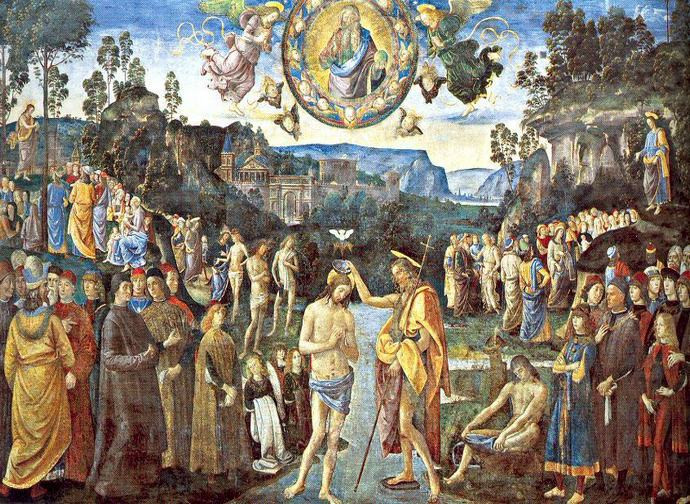The Baptism of Jesus
"It is I who need baptism from you, and yet you come to me!" Even John the Baptist, called to prepare the way for the Lord by preaching conversion through baptism, was unable to penetrate the divine mystery of the Baptism of Jesus in the river Jordan.

"It is I who need baptism from you, and yet you come to me!" Even John the Baptist, called to prepare the way for the Lord by preaching conversion through baptism, was unable to penetrate the divine mystery of the Baptism of Jesus in the river Jordan. So he tried to dissuade him, before being addressed by Christ, the Innocent One, lined up there along with sinners: "Leave it like this for the time being; it is fitting that we should, in this way, do all that uprightness demands."(Mt 3: 14-15) Through the teaching of the Fathers, the Church has seen in this mystery the sanctification of the waters of the Jordan and of every baptismal font, marking the beginning of the public life of Jesus: thus He accepted His mission as the suffering Servant, as prefigured in the Old Testament, particularly in the Book of Isaiah: "the upright one, my servant will justify many [...] for having exposed himself to death and for being counted as one of the rebellious, whereas he was bearing the sin of many and interceding for the rebellious." (Is 53: 11-12)
Baptism in the Jordan is another Epiphany, since Jesus here appears as the awaited Messiah and Son of God, One and Triune, glorified by the Holy Spirit who descends like a dove and "remains" on Him (Jn 1: 32-33), and by the Father who bears Him witness: "This is my beloved Son, in whom I am well pleased". Christ is the Son obedient in everything to the will of the Father: from baptism in the water – followed by fasting in the desert and then the devil's temptations – up to the blood baptism (Mk 10: 38-39) to be accomplished through His Passion and already implicit in the first. It is through his obedience that man's reconciliation with God is accomplished and the heavens that the sin of the progenitors had closed would be re-opened; Christ is therefore the sure way for every man who sacramentally unites himself to Him through Baptism, thus dying to sin and enabled to rise with Him by keeping the baptismal promises.
This intimate union between baptism and the paschal mystery explains why the Church celebrates the renewal of the baptismal promises on the Easter vigil, a call for the baptised to preserve the grace of the new life received with the first sacrament by observing the commandments and continually conforming to Christ. Hence the invitation to meditate on the Baptism of Jesus, which John Paul II indicated as the first of the five Mysteries of Light: these were introduced by the apostolic letter Rosarium Virginis Mariae to complete the traditional Joyful, Sorrowful and Glorious Mysteries of the Rosary by the key moments in Jesus' public life before His Passion: the Baptism in the Jordan, the Revelation during the Wedding at Cana, the Announcement of the Kingdom of God with the invitation to convert, the Transfiguration, the Institution of the Eucharist.
So it is Christ's actual testimony what explains our need for Baptism which, after the Resurrection, Jesus commands the apostles to administer to all peoples: "Go, therefore, make disciples of all nations; baptise them in the name of the Father and of the Son and of the Holy Spirit, and teach them to observe all the commands I gave you. And look, I am with you always; yes, to the end of time." (Mt 28: 19-20)
Finally, thanks to the outpouring of the Holy Spirit at Baptism, original sin is forgiven with all personal sins and all the punishment of sin, whereby the baptised become members of Christ, incorporated into his Church and adopted as children of God (Gal 4: 5-7). However, some temporal consequences of sin remain, such as pain and physical death, together with an inclination to sin that Tradition has called "concupiscence" but which certainly does not deprive the baptised of the freedom to choose good, as explained in the Catechism (on the basis of the Council of Trent): since concupiscence "is left for us to wrestle with, it cannot harm those who do not consent" and who, as Saint Paul has it, "Let your armour be the Lord Jesus Christ" (Rom 13:14)
Further readings:
Catechism of the Catholic Church, The Sacrament of Baptism (paragraphs 1213-1284).
For the Baptism of Jesus see, in particular: 535-537, 556, 565, 608, 701, 1223-1225, 1286


